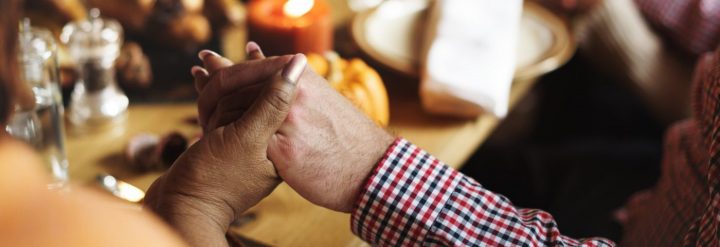I buy my favorite candy at Halloween, so if we don’t get a lot of trick-or-treaters, the candy won’t go to waste because I’ll eat it myself. In the United States, Halloween marks the beginning of the holiday season. For me, it’s nonstop eating from now until New Year’s Day.
After gorging myself on fun-size Kit Kats and Butterfingers for a couple of weeks, I prepare myself for the gluttony of Thanksgiving. Then begins the countdown to Christmas followed by a week of college football playoffs leading up to New Year’s Day. Healthy people may have brief bouts of guilt about overeating during this season of overindulgence. However, for IBD patients, we may also experience the physical pain of flares and other digestive issues.
When my husband, Patrick, and I were dating, we had to celebrate two Thanksgivings, usually lunch with my family and dinner with his. After we got married and my parents moved to Texas a short drive from his parents, I knew that I couldn’t eat two huge meals within four hours of each other for the rest of my life. So I asked my mother if we could invite my in-laws to our family meal. Now when both families are in town, I only stuff myself with one Thanksgiving dinner.
Christmas is more complicated, and the celebration lasts for at least three days straight — sometimes four. The reason for the extended festivities is that my older sister’s birthday falls on Christmas Eve. When she goes out of town to celebrate Christmas with her in-laws on alternate years, we have an early combined birthday and Christmas party for her. Then the family gets together again without her to celebrate Christmas Eve.
Patrick’s brother’s birthday is on Christmas Day. My mother-in-law believes he should have a separate celebration. So on Christmas Day, after having lunch with my family, we go to my in-laws’ house for my brother-in-law’s birthday dinner. We then have to go back the next day to celebrate Christmas on the 26th. By the third day I’m sick of eating, figuratively — and sometimes literally.
During the holidays, I have to watch my diet carefully because I don’t always have self-control with all the special food we eat only at this time of year. I have to make a conscious effort to avoid my trigger foods to prevent a flare. I also try to follow some diet tips recommended by the Crohn’s & Colitis Foundation to keep my gut health in check.
For instance, on days when we eat with our families, I eat small or frequent meals before and after the big feast. For breakfast, I might have a granola bar or oatmeal — just enough to give me the energy to start the day. Instead of a third meal, I’ll nibble on small snacks to satiate my hunger.
During the family dinner, I pay attention to portion sizes. Instead of piling food onto my plate, I’ll take a half portion or a small spoonful of each dish to taste. If I’m still hungry and go back for seconds, I’ll help myself to another spoonful of one or two of my favorites to keep me from overeating and to save room for dessert.
When we attend holiday parties, I make sure to have a healthy meal beforehand so that I don’t spend the evening snacking around the buffet table. That way, I avoid eating crudités with creamy dip and other snacks that will probably wreak havoc on my digestive system later on. As someone with a compromised immune system because of Remicade (infliximab), I must ensure that I avoid food poisoning by steering clear of dishes that have been sitting out for a while and limit my exposure to communicable diseases by staying away from platters that an infected person might have touched or double-dipped.
The holidays are a time for celebration. By ensuring that I’m not gorging myself on unhealthy foods or overeating in general, I can keep my IBD under control. Using this strategy, I can spend more time with my family and friends instead of in the bathroom by myself.
***
Note: IBD News Today is strictly a news and information website about the disease. It does not provide medical advice, diagnosis, or treatment. This content is not intended to be a substitute for professional medical advice, diagnosis, or treatment. Always seek the advice of your physician or other qualified health providers with any questions you may have regarding a medical condition. Never disregard professional medical advice or delay in seeking it because of something you have read on this website. The opinions expressed in this column are not those of IBD News Today, or its parent company, BioNews Services, and are intended to spark discussion about issues pertaining to IBD.

